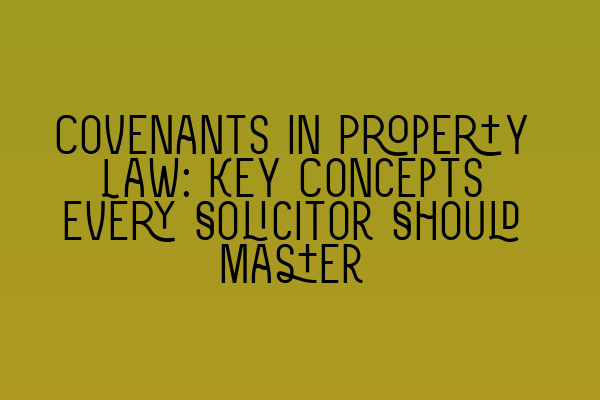Covenants in Property Law: Key Concepts Every Solicitor Should Master
Welcome to SQE Property Law & Land Law, where we provide comprehensive insights into various legal areas. In today’s blog post, we will dive deep into the world of covenants in property law. Whether you are a seasoned solicitor or a budding legal professional, understanding the key concepts surrounding covenants is crucial to success in this field. So let’s get started!
What are Covenants?
Covenants, in the context of property law, are legally binding promises or agreements made between parties regarding the use, enjoyment, and restrictions of a property. These agreements are typically found in contracts, leases, or land deeds and are designed to govern the rights and obligations of each party involved.
It is important to note that covenants can be affirmative (requiring a party to do something) or restrictive (prohibiting a party from doing something). These agreements are essential in maintaining the harmony and order within a community or development.
Types of Covenants
There are various types of covenants in property law, each serving a specific purpose. Let’s explore some of the most common ones:
1. Affirmative Covenants
Affirmative covenants require a party to perform a specific action. For example, a property owner might have a covenant to maintain the garden area or contribute to the maintenance of a communal facility. These covenants ensure the upkeep and proper functioning of shared spaces.
Click here for SQE 1 Practice Exam Questions
2. Restrictive Covenants
Restrictive covenants place limitations on what a party can do with their property. Common examples include restrictions on building height, color schemes, or the prohibition of certain activities. These covenants help preserve the aesthetic appeal, character, and peaceful existence of a development or neighborhood.
Practice Mocks FLK1 FLK2 can help you prepare for the SQE 1 exams.
3. Positive and Negative Covenants
Positive covenants require a party to undertake an action, whereas negative covenants prohibit a party from doing something. Both types of covenants play a crucial role in property law, as they regulate behaviors and protect the interests of all parties involved.
Enforcement and Remedies
Enforcing covenants can be a complex legal process. When a party breaches a covenant, the injured party may seek various remedies, such as:
1. Injunctions: A court order that requires a party to perform or cease a specific action. This remedy is often sought in cases of restrictive covenant violations.
2. Damages: A financial compensation awarded to the injured party for any losses suffered as a result of a covenant breach.
3. Specific Performance: This remedy compels the breaching party to fulfill their obligations as stated in the covenant. It is commonly sought in cases where monetary compensation is insufficient.
SQE 2 Preparation Courses are available to help you further enhance your legal skills.
Key Considerations for Solicitors
As a solicitor, it is essential to master the key concepts surrounding covenants in property law. Here are some important considerations:
1. Drafting Covenants
When drafting covenants, ensure that they are clear, unambiguous, and enforceable. Ambiguities can lead to disputes, and poorly drafted covenants may be deemed unenforceable.
2. Reviewing Existing Covenants
When reviewing existing covenants, pay close attention to any potential conflicts or inconsistencies. The ability to identify problematic covenants and advise clients accordingly is a valuable skill.
3. Negotiating Amendments or Discharge
In some instances, clients may seek to amend or discharge existing covenants. Negotiating these changes requires a solid understanding of the legal principles behind covenants and the ability to strike fair agreements.
Stay up-to-date with the latest SRA SQE Exam Dates to plan your preparation effectively.
Conclusion
Covenants are an integral part of property law, governing the rights and responsibilities of parties involved in property transactions. As a solicitor, mastering the key concepts surrounding covenants is essential to providing effective legal advice and representation to clients. By understanding the different types of covenants, enforcement mechanisms, and considerations, solicitors can navigate this complex area of law with confidence.
For further practice and preparation, we recommend taking advantage of our SQE 1 Practice Exam Questions and Practice Mocks FLK1 FLK2. Additionally, our SQE 1 and SQE 2 Preparation Courses are designed to equip aspiring solicitors with the necessary knowledge and skills to succeed in their legal careers.
Thank you for joining us at SQE Property Law & Land Law. We hope this blog post has provided valuable insights into covenants in property law. Stay tuned for more informative content!
